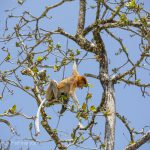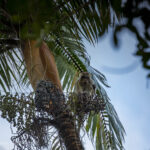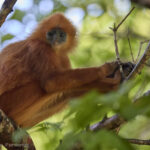Proboscis monkey – Nasalis larvatus Wurmb, 1787 – of Sabah / Borneo
Nasalis larvatus is an Old World colobine primate endemic to Borneo, where it occupies mangrove, riverine and swamp forests and is best known for the male’s greatly enlarged nose and semi aquatic habits. The binomen is Latin in origin: nasalis relates to the nose and larvatus derives from larva meaning mask or ghost and is often glossed as masked.
The species is currently assessed as Endangered on the IUCN Red List due to extensive habitat loss and fragmentation across its range.
General biology reflects its colobine heritage: it is primarily folivorous and frugivorous and possesses a sacculated foregut that enables microbial fermentation of leaves, with regurgitation and remastication documented in the wild.
Notable ecological adaptations include partially webbed digits and strong swimming, with groups closely tied to waterways along the lowlands of Borneo.





